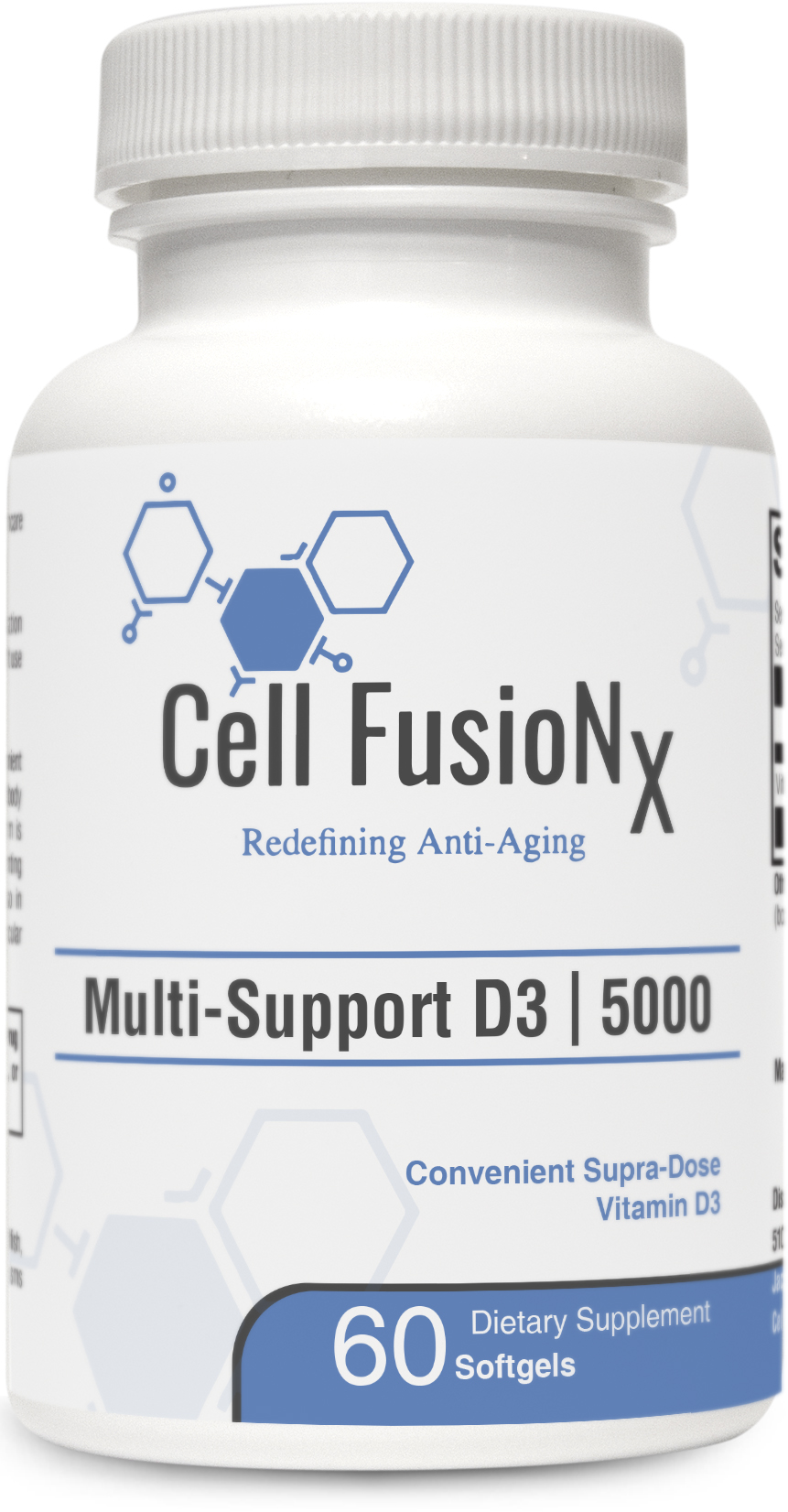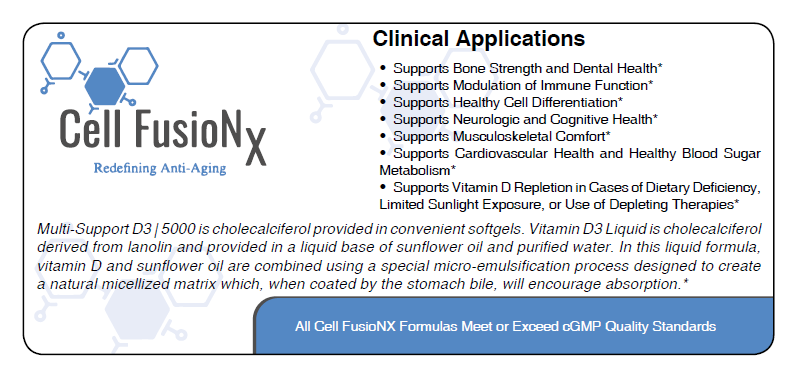Multi - Support D3 | 5000



Multi - Support D3 | 5000
Clinical Applications
• Supports Bone Strength and Dental Health
• Supports Modulation of Immune Function
• Supports Healthy Cell Differentiation
• Supports Neurologic and Cognitive Health
• Supports Musculoskeletal Comfort
• Supports Cardiovascular Health and Healthy Blood Sugar Metabolism*
• Supports Vitamin D Repletion in Cases of Dietary Deficiency, Limited Sunlight Exposure, or Use of Depleting Therapies
Multi-Support D3 | 5000 is cholecalciferol provided in convenient softgels. Vitamin D3 Liquid is cholecalciferol derived from lanolin and provided in a liquid base of sunflower oil and purified water. In this liquid formula, vitamin D and sunflower oil are combined using a special micro-emulsification process designed to create a natural micellized matrix which, when coated by the stomach bile, will encourage absorption.*
Discussion
While vitamin D3 (cholecalciferol) is made in the skin when 7-dehydrocholesterol reacts with sunlight, many things affect
the degree to which this biosynthesis occurs, including time of day, seasons, location, smog/pollution, clothing, shade of
skin (darker skin requires more sun), and sunscreen use. Low-cholesterol diets and certain cholesterol therapies can also
affect vitamin D formation. By some estimates, one billion people worldwide have vitamin D deficiency or insufficiency.[1]
Reversing deficiency and maintaining optimal serum vitamin D levels beneficially impacts biochemistry and numerous body
systems; this is largely because calcitriol—the metabolic product of vitamin D—is a secosteroid hormone that targets over
200 genes in a wide variety of tissues.[2,3] As the research demonstrates, vitamin D is clearly imperative for the development,
growth, and maintenance of a healthy body from gestation to senescence.*
Bone Health The body needs vitamin D to absorb calcium, and the importance of vitamin D in skeletal health and bone
density is well established. Although bone density is most often associated with calcium intakes, insufficient vitamin D
negatively affects calcium absorption.[3] Without adequate absorption, the body must take calcium from its stores in the
skeleton, which weakens existing bone and prevents the formation of strong, new bone. Clinical research shows that taking
vitamin D orally with calcium supplements can support healthy bone turnover[4-6], and adequate calcium and vitamin D
throughout life—as part of a well-balanced diet—may reduce the risk of osteoporosis.*
The Expanding Roles of Vitamin D The role of vitamin D in good health continues to expand as the knowledge of this
vitamin’s effects on different body systems grows. Research now suggests that optimal serum levels of vitamin D support
normal cell differentiation,[3,7] cardiovascular health,[2,3] normal immune function,[8] good balance,[2] healthy mood,[9] normal fetal development,[10] neuronal growth and neurodevelopment,[2,3,10,11] healthy glucose metabolism,[2,3] musculoskeletal comfort,[2,3] periodontal health,[12] and normal intestinal immune responses.[8] Areas of research that have gained momentum over the past several years concern the relationship of vitamin D deficiency or insufficiency to changes in cellular proliferation, changes in fetal brain development, and mental health.[7,10,13-15] Evidence is also mounting that vitamin D supplementation may provide key immune support.*[16-19] D2, D3, and Metabolites As previously stated, D3 is the form of vitamin D produced in the skin. D2 (ergocalciferol) is derived from fungal sources by activating ergosterol with ultraviolet light. It is not naturally present in the human body. After vitamin D is formed in the skin or taken orally, it is metabolized into two different substances within the body: calcidiol (25-hydroxyvitamin D) and calcitriol (1,25-dihydroxyvitamin D). Calcidiol is the body’s main storage form of vitamin D, while calcitriol (made from calcidoil) is “activated” vitamin D. Although D2 and D3 are similar biochemically, a recent study reported D3 to be approximately 87% more potent in raising and maintaining serum calcidiol concentrations and in producing two- to threefold greater storage of vitamin D than did equimolar D2.*[20]
